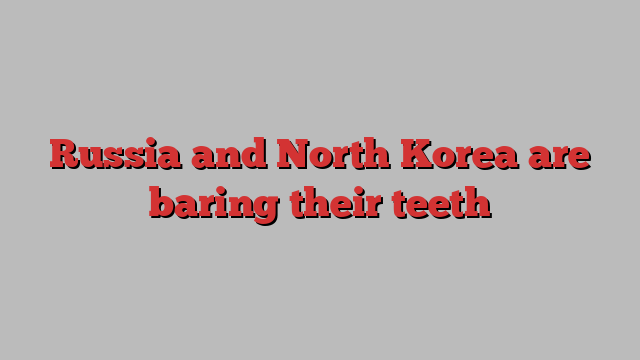
Receive free Geopolitics updates
We’ll send you a myFT Daily Digest email rounding up the latest Geopolitics news every morning.
The writer is professor of Korean Studies at Kookmin University
Last month, two strongmen met in the wilderness of Russia’s far east. The second summit between Vladimir Putin and Kim Jong Un took place at the Vostochny Cosmodrome, a major long-range rocket and missile base.
This time, the military implications were much emphasised. Both delegations included an unusually high share of top military brass, and after the summit’s crabmeat dumplings lunch, Kim and his entourage embarked on a tour of Russian military facilities, including an air force base and a jet fighter factory. The local governor gave Kim a few newly made drones and a set of high-tech body armour as mementoes.
It might seem logical to conclude that Russia is about to dramatically boost military co-operation with North Korea, buying North Korean shells for the war in Ukraine, and is also ready to give Kim rewards such as missiles, satellites and nuclear submarine technologies.
But such deals would violate UN Security Council resolutions that Russia once voted for. No one expects the Russian government to be too law-abiding, but why advertise such deals so publicly? It was not necessary to bring Kim himself to the space base and give a him a tour in front of television cameras. A group of engineers and air force colonels in plain clothes would probably have done a better job while ensuring secrecy or plausible deniability.
The summit’s martial emphasis and the barrage of thinly veiled hints and innuendo make one suspect that the Russian government actually wants the world to believe that it is going to co-operate with Pyongyang.
When people talk about military co-operation between North Korea and Moscow, two themes are prominent: shipments of North Korean ammunition to Russia and the transfer of Russian military technologies to North Korea.
Reports about North Korean supplies first appeared in September 2022, but so far the artillery has failed to materialise on the battlefield. The only recorded case of its use was by Ukrainian troops, who reportedly received it from a “friendly country” that had intercepted a North Korean ship at sea.
This does not mean that there have been no shipments, but indicates the amounts are not large. That is not surprising. North Korea, though heavily militarised, is a small economy with limited production capacities.
What about technology transfers, so obviously hinted at during the summit? Russia has little to gain from them. North Koreans are unable to pay the proper price for such expensive technologies. And, once such technologies were dispatched, the Russians would lose control and Pyongyang would happily resell them to third parties. They are believed to have done this more than once. In the 1980s, they were reported to have sold Iran clones of Soviet missiles built using technology that Pyongyang had stolen, probably via Egypt or Syria.
Last but not least, such transfers would not please China, which wants a stable North Korea, but not an excessively strong one.
So, why the martial theatre? Most likely, to send a signal to Seoul. There has been talk of South Korea shipping lethal aid to Ukraine. Seoul officially says it will not send weapons, but some conservatives in South Korea want to do so. Pressure is mounting from Washington, too.
Such a decision by Seoul would have consequences. South Korea is an industrial giant and the world’s seventh largest arms exporter. Its ammunition would make a real difference. Now Seoul — and Washington — is being given a warning: if it sends ammunition, Russia can impose a cost.
Will South Korea ignore the warning? Will Russians make good on these threats? Overall, the Kim-Putin summit probably means less than most people think.